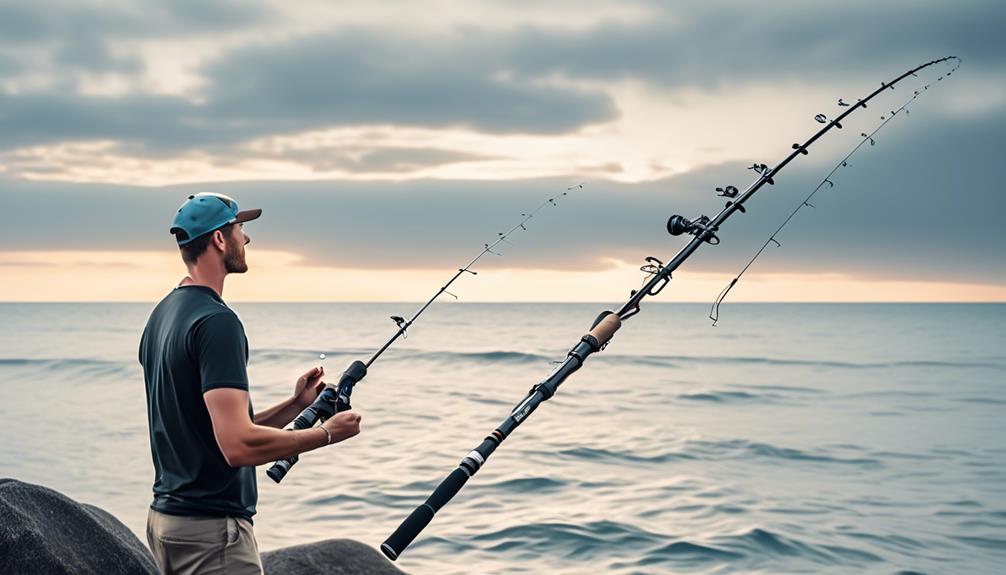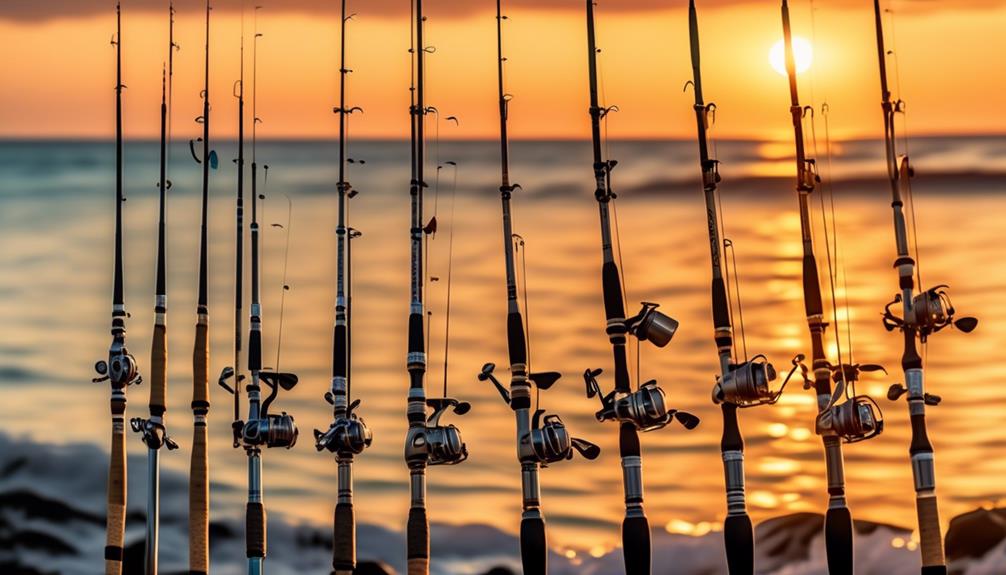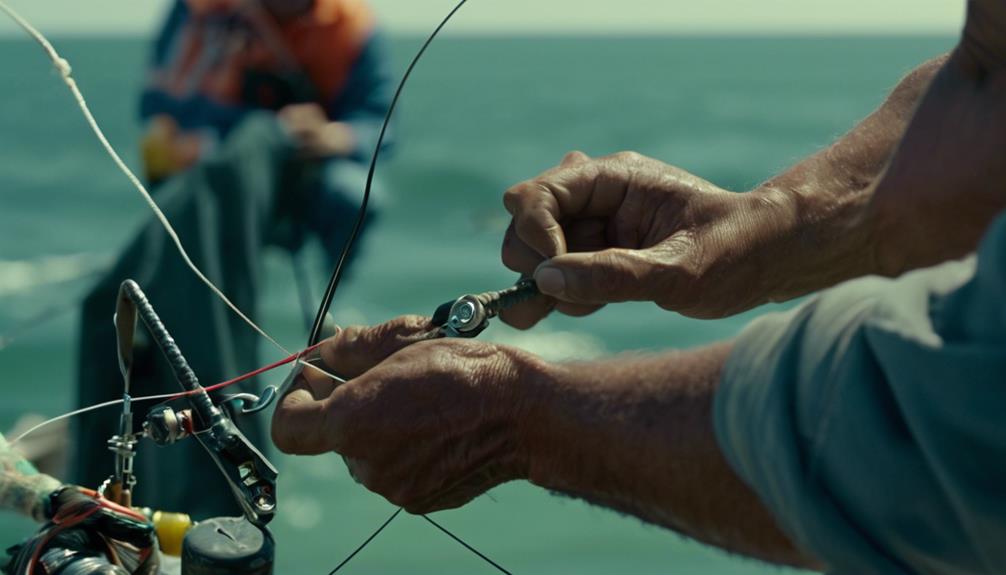You've probably heard the saying, 'Give a man a fish, and you feed him for a day. Teach a man to fish, and you feed him for a lifetime.'
When it comes to saltwater fishing, having the right rod can make all the difference between a successful catch and a frustrating day on the water. Whether you're a seasoned angler or just starting out, knowing which rods are best suited for saltwater fishing is essential.
So, how do you choose the right one for your needs?
Spinning Rods
When selecting a spinning rod for saltwater fishing, consider the rod's length and action to match the targeted fish species and fishing conditions.
The rod's length affects casting distance and leverage, with longer rods casting farther and providing more power for fighting larger fish. On the other hand, shorter rods offer better accuracy and control in tight spaces.
The action of the rod refers to where it flexes along the blank, influencing its sensitivity and hook-setting power. Fast-action rods bend mostly at the tip, ideal for quick hook sets and fishing in open water, while slower action rods bend more towards the middle, providing better control when fighting fish in heavy cover.
When it comes to rod materials and durability, look for spinning rods made of high-quality graphite or fiberglass. Graphite rods are lightweight, sensitive, and offer excellent power, perfect for targeting a wide range of saltwater species. On the other hand, fiberglass rods are more durable and flexible, ideal for handling larger, hard-fighting fish and rough saltwater conditions.
As for reel compatibility, ensure that the spinning rod is designed to accommodate the reel size and type you intend to use. Additionally, consider the action of the rod, as it should match the fishing techniques and conditions you expect to encounter.
Casting Rods
To maximize your saltwater fishing experience, consider exploring casting rods as an alternative to spinning rods, offering a different set of advantages for targeting various fish species and adapting to diverse fishing conditions. When it comes to casting rods, there are several key factors to consider:
- Rod Material Options: Casting rods are available in a variety of materials, including fiberglass, graphite, and composite blends. Each material offers distinct characteristics such as flexibility, sensitivity, and strength. Fiberglass rods are durable and provide greater flexibility, making them suitable for heavy cover fishing. On the other hand, graphite rods are lightweight and offer enhanced sensitivity, ideal for detecting subtle strikes in open water. Composite blends combine the best of both materials, providing a balance of strength and sensitivity.
- Casting Techniques: Mastering casting techniques is crucial for effectively using casting rods. Techniques such as flipping, pitching, and overhead casting require practice and precision. Flipping and pitching are ideal for targeted presentations in heavy cover, while overhead casting is suitable for covering larger areas of water. Additionally, understanding how to adjust the reel's braking system and fine-tune the casting motion can greatly improve accuracy and distance.
Exploring the different rod material options and honing your casting techniques will enable you to make the most of casting rods, enhancing your saltwater fishing prowess.
Surf Fishing Rods
Consider selecting a surf fishing rod designed specifically for handling the challenges of saltwater environments, providing you with the strength and versatility needed to tackle larger fish species and powerful ocean currents. Beach fishing requires equipment that can withstand the corrosive nature of saltwater and handle the demands of casting bait or lures into the surf. When it comes to saltwater angling, a surf fishing rod is an essential tool for targeting species like striped bass, redfish, tarpon, and more.
Surf fishing rods are typically longer than other fishing rods, often ranging from 9 to 14 feet, to allow for longer casting distances and to keep your line above the breaking waves. They're designed to handle heavy lines and large, heavy baits or lures. Look for a rod with a sturdy construction, such as graphite or fiberglass, to withstand the harsh saltwater environment and the pull of strong ocean currents. Additionally, many surf fishing rods feature specialized guides and reel seats that can handle the larger reels necessary for saltwater fishing.
When selecting a surf fishing rod, consider the type of fish you'll be targeting and the specific conditions of the beach or coastline where you'll be fishing. A longer rod may be beneficial for casting distance, while a shorter rod may provide more control in rough surf. Ultimately, a quality surf fishing rod will give you the strength and casting ability needed to tackle saltwater angling with confidence.
Jigging Rods
If you've been exploring saltwater fishing with surf rods, you'll want to equip yourself with a reliable jigging rod tailored for the specific technique of vertical jigging in deep waters. When choosing a jigging rod, consider the following key factors:
- Rod Action and Line Weight: Opt for a jigging rod with a fast or extra-fast action to effectively work the jig in deep waters. This action allows for quick hook sets and better control over the fish. Pair the rod with a line weight suitable for the target species and the depth you'll be fishing in. Heavier lines are often necessary for deeper jigging to handle larger, aggressive fish.
- Jigging Techniques and Fishing Depth: Different jigging techniques, such as speed jigging or slow pitch jigging, require specific rod characteristics. Ensure the rod you choose aligns with the jigging style you prefer. Additionally, consider the fishing depth you'll be targeting. For deeper waters, opt for a longer and more powerful jigging rod to handle the increased pressure and the larger fish species found at those depths.
Selecting the right jigging rod is crucial for a successful saltwater fishing experience. By paying attention to rod action, line weight, jigging techniques, and fishing depth, you can ensure that you're well-prepared to tackle the challenges of vertical jigging in deep waters and maximize your chances of landing that prized catch.
Trolling Rods
When selecting a trolling rod for saltwater fishing, prioritize a rod with a medium to heavy power rating for handling larger game fish. Trolling rod features are crucial for success in saltwater fishing. Look for rods with a sturdy construction, such as fiberglass or graphite, to withstand the harsh saltwater environment and the pressure of reeling in big catches.
Additionally, consider the length of the rod; longer rods provide more leverage when fighting powerful fish, while shorter rods offer better maneuverability on the boat. Opt for a rod with a fast action, as it allows for quick hook sets and better control over the fish during the fight. When it comes to the reel seat, ensure it's durable and corrosion-resistant to withstand exposure to saltwater.
Trolling rod maintenance is essential for ensuring longevity and peak performance. After each use, rinse the rod with freshwater to remove any salt residue that could cause corrosion. Inspect the rod for any signs of damage, such as nicks or cracks, and address them promptly to prevent further deterioration.
Store the trolling rod in a cool, dry place to avoid moisture buildup, which can lead to rust and weakening of the rod material. Periodically check the rod guides and reel seat for any signs of wear and tear, and replace any damaged components as needed to maintain optimal functionality. Following these maintenance practices will help extend the lifespan of your trolling rod and keep it in top condition for many successful fishing trips.
Offshore Rods
Looking for a reliable offshore rod for saltwater fishing? When it comes to tackling deep sea and big game fish, having the right gear is crucial. Here are some top options to consider for your offshore fishing adventures:
- Shimano Tallus Blue Water Casting Rod: This rod is designed for handling big game fish like tuna and marlin. With a strong and durable construction, it provides the power and performance needed for offshore fishing.
- Penn Carnage II Jigging Casting Rod: Built to withstand the demands of offshore jigging, this rod offers exceptional sensitivity and strength. It's perfect for targeting a variety of deep sea species like amberjack and grouper.
- Daiwa Saltiga Dendoh Style Deep Drop Rod: Specifically crafted for deep sea fishing, this rod is engineered to handle the extreme pressures of deep water angling. It's ideal for pursuing bottom-dwelling species such as tilefish and swordfish.
- Okuma Makaira Stand-Up Rod: This rod is designed for battling large pelagic species such as sailfish and sharks. Its advanced blank design and componentry make it a top choice for offshore anglers seeking a powerful and reliable rod.
When selecting an offshore rod, consider the specific species you'll be targeting and the type of fishing techniques you'll be employing. Look for a rod that offers the right combination of strength, flexibility, and sensitivity to tackle the challenges of deep sea and big game fishing.
Telescopic Rods

Telescopic rods are a convenient and versatile option for saltwater fishing enthusiasts. These rods are collapsible, making them easy to transport and store, which is especially beneficial for anglers who are on the go.
When it comes to saltwater fishing, telescopic rods offer several advantages. They're typically lightweight, making them suitable for long casting sessions, and their collapsible nature allows for easy maneuvering on boats or in tight spaces. However, it's important to consider the drawbacks as well. Telescopic rods may not provide the same level of sensitivity and power as traditional one-piece rods, and their collapsible design could potentially lead to durability issues over time, especially when battling large saltwater species.
To ensure that your telescopic rods remain in top condition, proper maintenance is essential. After each saltwater fishing trip, it's crucial to thoroughly rinse the rod with freshwater to remove any salt residue that could cause corrosion. Pay close attention to the rod joints, as these areas are more prone to salt buildup. Once cleaned, allow the rod to fully dry before collapsing it for storage.
Additionally, periodically inspect the rod for any signs of wear or damage, such as cracks or weakened joints. By taking these maintenance measures, you can prolong the lifespan of your telescopic rods and continue to enjoy their portability and convenience for saltwater fishing adventures.
Travel Rods
To maximize portability and convenience in your saltwater fishing adventures, consider the versatility of travel rods, a compact and efficient option for anglers on the go.
Travel rods are designed with the utmost convenience in mind, offering a range of benefits that make them an ideal choice for those who enjoy fishing in various locations.
Here are four reasons why travel rods are worth considering:
- Compact designs: Travel rods are specifically engineered to be compact and easy to transport. Whether you're backpacking to remote fishing spots or traveling long distances by car, these rods can be conveniently packed into a travel case or backpack, allowing you to bring your fishing gear wherever your adventures take you.
- Versatile options: Despite their compact size, travel rods offer versatile options that cater to different fishing needs. From lightweight spinning rods for inshore fishing to heavier casting rods for offshore excursions, these travel-friendly rods come in a variety of lengths and actions, ensuring that you can find the right rod for the specific saltwater environments you'll be fishing in.
- Durable construction: Many travel rods are constructed with durable materials such as carbon fiber or graphite, ensuring that they can withstand the rigors of saltwater fishing. This durability makes them reliable companions for your angling expeditions, providing peace of mind that your rod can handle the demands of saltwater environments.
- Convenient storage: Travel rods often come with their own protective cases, offering convenient storage and protection for your rod during transport. This not only keeps your rod safe from damage but also helps to keep your other gear organized and easily accessible when you reach your fishing destination.
Frequently Asked Questions
What Are the Best Types of Bait to Use With Each Specific Type of Saltwater Fishing Rod?
When choosing bait for your saltwater fishing rod, consider the species you're targeting. Live bait like shrimp and cut bait work well for bottom fishing, while artificial lures are great for casting and trolling. Mastering bait selection enhances your fishing techniques.
What Are the Most Common Mistakes Anglers Make When Using Spinning Rods for Saltwater Fishing?
When using spinning rods for saltwater fishing, common mistakes include improper casting techniques, neglecting rod maintenance, and using the wrong bait. To avoid these, focus on proper techniques, regular rod maintenance, and selecting the right bait.
How Can I Properly Maintain and Store My Telescopic Saltwater Fishing Rod to Ensure Its Longevity?
To properly maintain and store your telescopic saltwater fishing rod for longevity, wipe it down after each use, check for any damage, and store it in a dry, cool place. Avoid leaving it in direct sunlight or damp conditions.
Are There Any Specific Techniques or Tips for Using Casting Rods in Different Saltwater Fishing Environments?
When fishing in diverse saltwater environments, casting rods require specialized techniques. Ensure proper handling to optimize your experience. Utilize tips for casting accuracy and adapt to varying conditions for successful saltwater fishing.
What Are the Key Differences Between Offshore Rods and Trolling Rods, and When Is It Best to Use Each One for Saltwater Fishing?
When deciding between offshore and trolling rods, consider the fishing environment. Offshore rods are for deep-sea fishing, while trolling rods are for pelagic species. For inshore or shallow water fishing, use trolling rods for bottom fishing reef fish.
Conclusion
Whether you're a beginner or seasoned angler, there's a saltwater fishing rod out there for you. From spinning rods to offshore rods, there are plenty of options to suit your fishing style and needs.
Make sure to consider factors like length, power, and action to find the best rod for your next saltwater fishing adventure.
So, grab your gear, head out on the water, and reel in the big ones with one of these top saltwater fishing rods.



